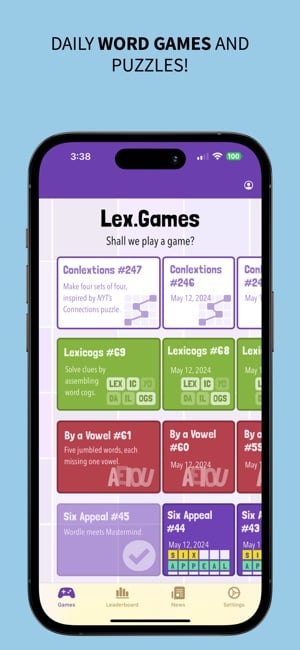06/06/24 8:39 am
My favorite side-hustles are the ones that start as whims.
The New York Times launched Connections puzzles about a year ago. I thought they were great — fun, creative puzzles that required grouping 16 words into four sets of four. There were plenty of misdirections, tricks, and clever wordplay.
I wanted to write my own. (When I like playing puzzles, I like trying to create those puzzles. I don’t know why; it’s just who I am.)

So I found a random website that let you create your own Connections-style puzzles. It worked! Except one of my early puzzles had a typo, and I realized the site didn’t offer a way to edit your existing puzzles. Thus, I decided the only reasonable course of action was to create my own Connections-style website, which I did.
And then, because I could, I started publishing a “Conlextions” puzzle every day. And then I added a second kind of puzzle, called Lexicogs. And then a third, an original concept of mine called By A Vowel.
Now, I publish nine daily games. Which is bonkers, but also fun — ideally not just for me, but for the folks who play my games. Now in addition to my website — Lex.Games — I also built a real live iOS app (my first solo app!), available in the App Store.
I swear I’m not sharing all this to stealth market my games. I market my games loudly, often, and endlessly. Rather, I’m sharing all this because of something fascinating I’ve learned about humans by writing games.
I don’t always know when, say, a Conlextions puzzle skews harder. (Sometimes I know in advance. Sometimes I’m surprised.) But I always find out very quickly when a new puzzle launches.
Harder puzzles get fewer total plays per day. And there’s a simple explanation: People share their scores when they do well, and more people play when they see more people sharing their scores.
What I’ve learned from this seems somewhere between obvious and not-so-obvious: We want word games to feel challenging, because we want to feel accomplished for solving them. We want to feel smart. But we don’t want those games to be too hard, because if we can’t solve them, we feel one of two things (or perhaps both). We feel stupid, and we feel annoyed at the puzzle writer for making the damn puzzle too hard.
I know this is what we feel, because it’s what I feel on days I can’t solve NYT’s original Connections puzzle. I feel grumpiness (or worse!), I’m mad at the author — it’s not great. But of course, when I successfully solve the puzzle, I’m convinced of my own brilliance. On my most magnanimous days, I may even silently congratulate the puzzle author on their cleverness, too.
There’s power in recognizing this truth of human psychology. We want to feel smart. We want to feel like we’ve solved the challenging thing. But if it’s too hard, we’re unlikely to want to shoulder the blame ourselves. We’d rather it be someone else’s fault.
When you’re dealing with prospects, clients, negotiation counterparties, or other humans, finding ways to genuinely and organically make them feel smart or insightful will serve you well. Careful, of course; you can’t fake it. You can’t compliment someone for a brilliant insight if they’ve merely told you that water is wet. But it’s worth the effort to try to tee people up — to guide them to an answer or compromise you like, where they can feel the pride of discovering it. You don’t need the credit. You need the benefit of their personal satisfaction.
Anyway, play my games.